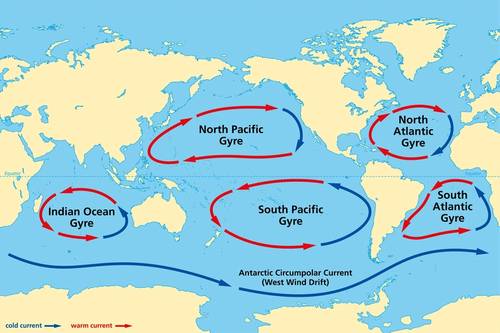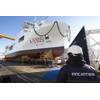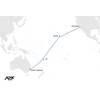The World’s Most Powerful Ocean Current Could Slow by 2050
New research from the University of Melbourne, Australia, indicates that the more Antarctic ice melts and the more the ocean is flooded by melt water, the more the Antarctic Circumpolar Current (ACC) is likely to slow down.
The ACC is located just to Australia’s south. It flows around Antarctica and connects our planet’s three major ocean basins – the Pacific, Atlantic and Indian Oceans.
The ACC is more than 100 times stronger than the current of the Amazon River and five times stronger than the Gulf Stream.
It’s a powerful current that separates the Antarctic continent from its northern neighbors, acting as a physical and oceanographic barrier that isolates the icy continent.
Over the years, there has been a lot of scientific debate about the impact of climate change on the ACC. The theory was that warming oceans around Antarctica should cause the ACC to speed up.
Although recent research has shown that the ACC’s strength hasn’t changed significantly, the impact of Antarctica’s melting ice is less well understood by the science.
The new study, published in Environmental Research Letters, has found that the ACC is likely to slow down by up to 20% in 2050 if high carbon emissions continue.
“We analyzed a state-of-the-art model projection of the global ocean, created by colleagues at the University of New South Wales, which finds that the key driver of this slowdown is ice melting around Antarctica,” said Dr Taimoor Sohail and Associate Professor Bishakhdatta Gayen, University of Melbourne.
If the ACC were to weaken, it may allow the migration of warmer water towards Antarctica, which would cause more ice to melt and slow the current even more – creating a vicious cycle.
And with that warm water comes the potential for migrating invasive species like the Southern Bull Kelp to reach Antarctica, disturbing the food web there – something the ACC may currently help to prevent.
There may be global repercussions. A slowdown, along with any decline in ACC strength, is expected to reduce the ocean’s ability to absorb heat and carbon from the atmosphere. This has the potential to speed up climate change – both on land and in the ocean.
While the researchers are confident that the melting ice will slow down the ACC, it’s unclear how much and where. Some studies suggest it may be too late to prevent melting in West Antarctica, but East Antarctic melting remains potentially preventable.
To do this, the world must focus on reducing greenhouse gas emissions to prevent the ocean absorbing more atmospheric heat that’s ultimately directed towards Antarctica, say the researchers.















 December 2025
December 2025



